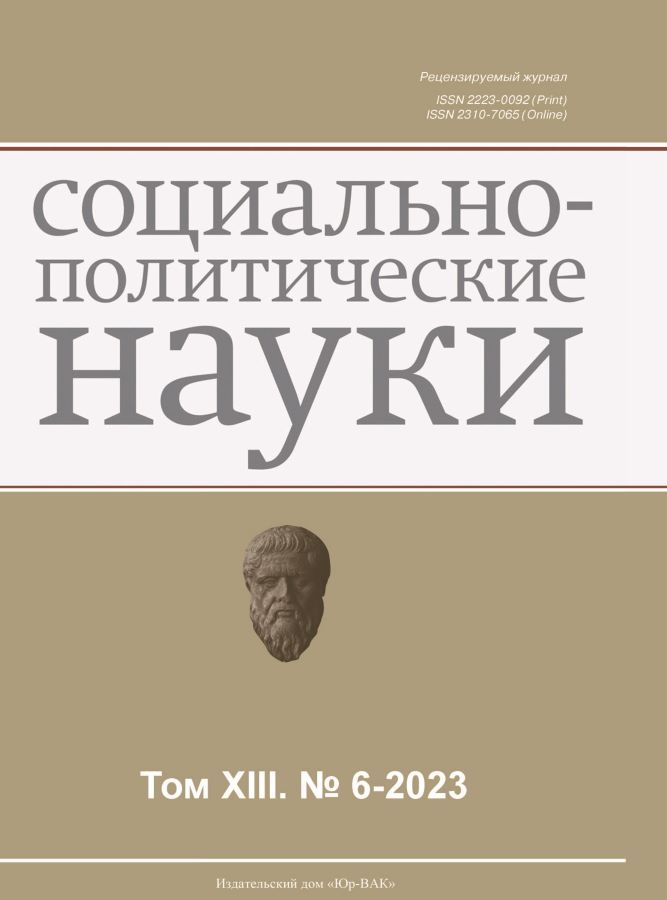Prognostic Component of the Civilizational State Modern Russia and of its Spiritual and Moral Imperatives
- Autores: Asonov N.V.1,2
-
Afiliações:
- Moscow Pedagogical State University (MPSU)
- Institute of Scientific Information for Social Sciences of the Russian Academy of Sciences (ISISS RAS)
- Edição: Volume 13, Nº 6 (2023)
- Páginas: 13-23
- Seção: History and Theory of Politics
- URL: https://journals.eco-vector.com/2223-0092/article/view/623830
- DOI: https://doi.org/10.33693/2223-0092-2023-13-6-13-23
- EDN: https://elibrary.ru/ABMCMM
- ID: 623830
Citar
Texto integral
Resumo
The purpose of the research. Based on the methodology of political science and the associated paradigmatic component of scientific prediction of social phenomena and processes, the author of the article built his own predictive model of civilizational change in Russia and a possible way to restore the lost elements of state identity. The purpose of the research is to determine the current position of Russia within the framework of the established world community and, on its basis, to reveal the specifics of the prognostic component of the political analysis of its civilizational state and of the spiritual and moral imperatives. The nature of this work is based on the combined use of general scientific and private methods used within the framework of political analysis, supplemented by a basic set of research paradigms that allow us to give a more in-depth forecast of the possible civilizational drift of Russia in the 21st century.
Results. In the course of the analysis, the author came to a number of conclusions, according to which the Russian Federation, having lost its civilizational identity in 1986–1993, was integrated into the North Atlantic community as a “granddaughter society.” Thus, Russia returned to the imperialist state of “decaying capitalism,” but as a dependent element of this community, loss of the historical union of generations. Its inherent characteristics, identified in 1916 by V.I. Lenin, preserved their nature and created the conditions for the inevitable death of civilizational diversity and the emergence of a “global human race” leading to the complete degeneration of the world community. Only Russia can stop this process if trends aimed at a real, rather than a declarative return to civilizational identity prevail and service of the historical union of generations.
Texto integral
Sobre autores
Nikolai Asonov
Moscow Pedagogical State University (MPSU); Institute of Scientific Information for Social Sciences of the Russian Academy of Sciences (ISISS RAS)
Autor responsável pela correspondência
Email: nbassonov@yandex.ru
Código SPIN: 5304-5496
Dr. Sci. (Polit.), Associate Professor, Professor, Department of Political Science (MSPU), leading researcher
Rússia, Moscow; MoscowBibliografia
- Bespalova T.V. The future of Russian civilization: some ideological contours. Questions of Social Theory. 2020. Vol. 12. Pр. 131–143. (In Rus.)
- Gaidar E.T. For a long time. Russia in the world: essays on economic history. Moscow: Delo, 2005. 656 p.
- Glazyev S. Creation of the Eurasian Economic Union and prospects for its cooperation with the European Union. In: Greater Europe of Nations: Collection of articles. J. Lockland (comp.). Moscow: Historical Perspective Foundation, 2016. Рp. 21–30.
- Gumilev L.N. Ethnosphere: History of people and history of nature. Moscow: Ecopros, 1993. 544 p.
- History of diplomacy. In 3 vols. Vol. 1. V.P. Potemkin (ed.). Moscow: OGIZ, 1941. 568 p.
- Katasonov V. World bondage. Robbery in... Moscow: Algorithm, 2020. 384 p.
- Kissinger G. World order. Moscow: Algorithm, 2015. 512 p.
- Kissinger G. Does America need a foreign policy? Moscow: AST, 2016. 416 p.
- Kissinger G. Understand Putin. Common sense politics. Moscow: Algorithm, 2015. 208 p.
- Krylov K.A. Behavior. Moscow: Alkor Publishers, 2021. 194 p.
- Chiesa J. War of Empires: East–West. Influence offers section. Moscow: Eksmo, 2006. 320 p.
- Lenin V.I. Imperialism as the highest stage of capitalism. In: Selected works. In 10 vols. Vol. 6. Moscow: Politizdat, 1985. 695 p.
- Panarin A.S. The truth of the Iron Curtain. Moscow: Algorithm, 2006. 336 p.
- Panarin A.S. Orthodox civilization in a global world. Moscow: Algorithm, 2002. 492 p.
- Panarin A.S. Civilization and barbarism: The future of Russia in a global perspective. Almanac Space and Time. 2015. Vol. 9. Issue 1: Civil Society and Citizen Society: Issues of Theory and Practice. Thematic issue of the Department of Philosophy of Politics and Law, Faculty of Philosophy, Lomonosov Moscow State University. URL: https://cyberleninka.ru/article/n/tsivilizatsii-i-varvarstvo-buduschee-rossii-v-globalnoy-perspektive/viewer
- Polanyi K. The great transformation: Political and economic origins of our time. St. Petersburg: Aletheya, 2002. 320 p.
- Putin V.V. Direct speech. In 3 vols. Vol. 1. Messages to the Federal Assembly. Moscow: Belfry-MG; New Key, 2016. 412 p.
- Russia as a civilization of the future. In: Questions of social theory: Scientific almanac. Vol. XII. Yu.M. Reznik (ed.). Moscow: Publishing House of the Independent Institute of Civil Society, 2020. 288 p.
- Shabrov O.F. National-state identity in the context of global confrontation: The problem of the stability of social systems. Sociopolitical Sciences. 2023.No. 4. Рр. 16–26. (In Rus.)
- Shabrov O.F. Political management. Moscow: Intellect, 1997. 200 p.
- Ashby W.R. Brain construction. Origin of adaptive behavior. Moscow: Foreign Literature, 1962. 395 p.
- Fukuyama Q. The decline of state order. Moscow: AST, 2017. 704 p.
- ideas to fix the world: Conversations with the world’s foremost thinkers. P. Dutkiewicz, R. Sakwa (eds.). Moscow: MGU, 2014. 528 p.
- Bell K. American ascendancy and the pretense of power. The National Interest. 1999. No. 57. Рр. 55–63.
- Heymann H.G. Die gemischen Werke in deutschen Grobeisengewerbe. Stuttgart, Berlin, 1904. 342 р.
Arquivos suplementares









